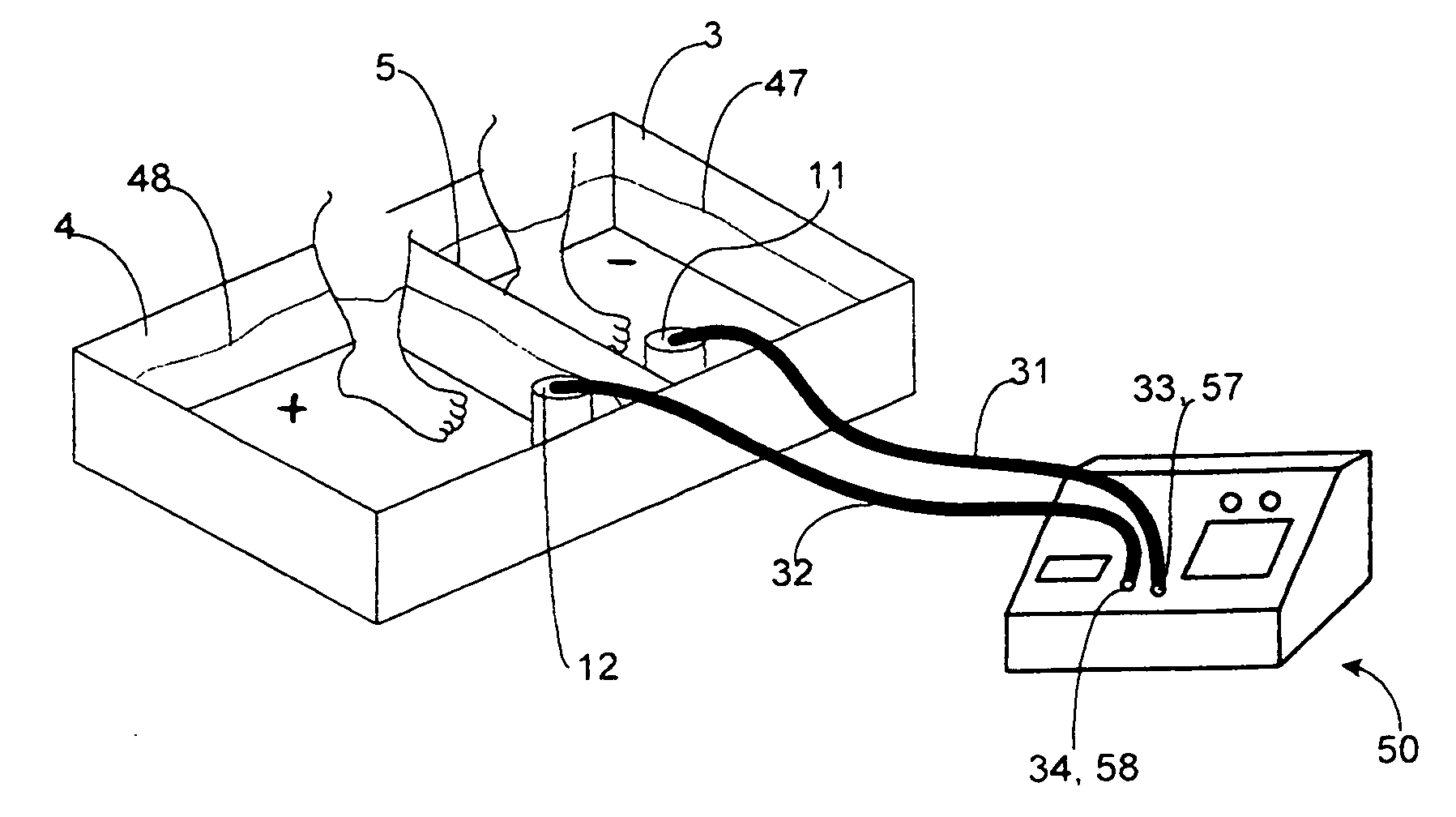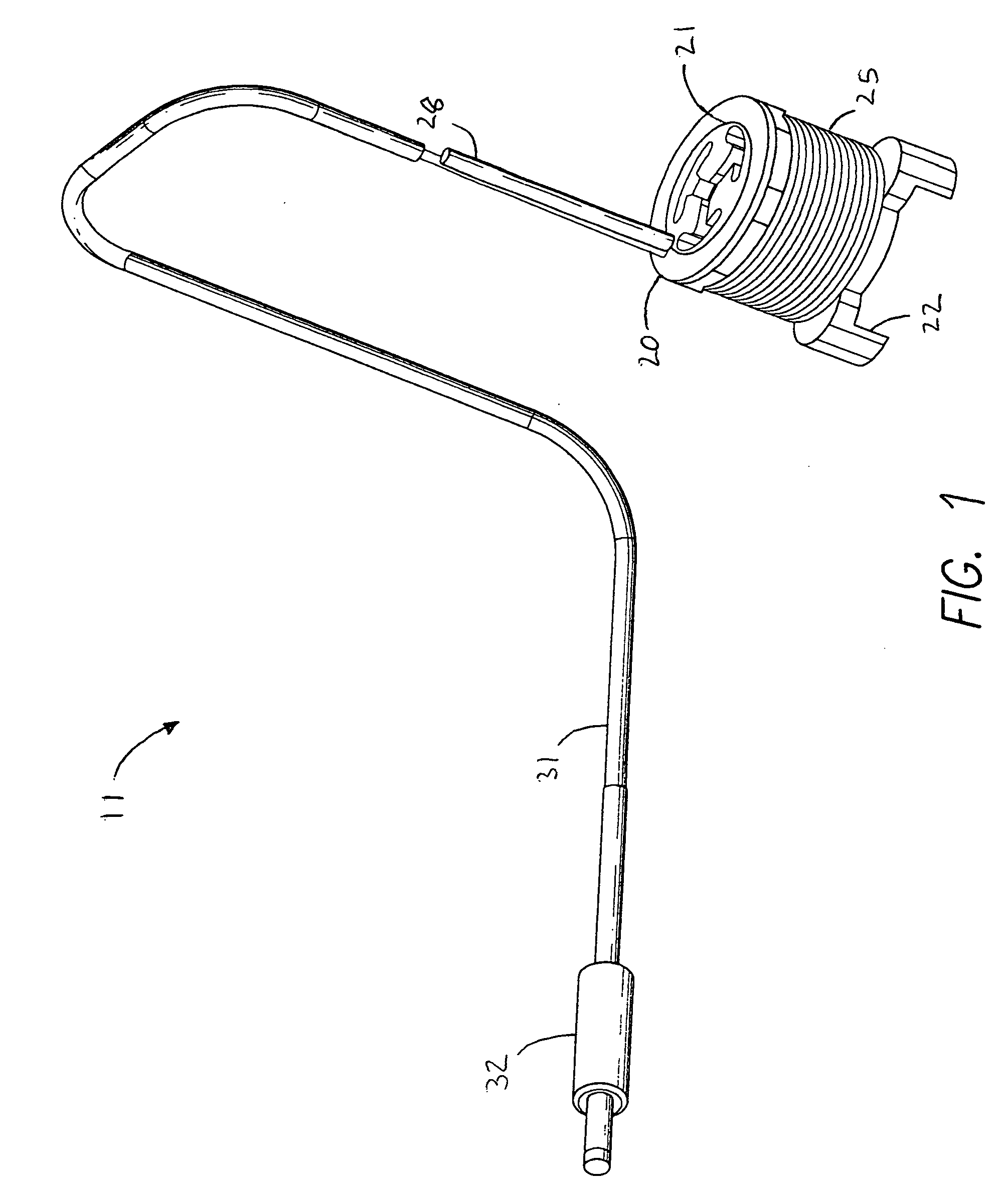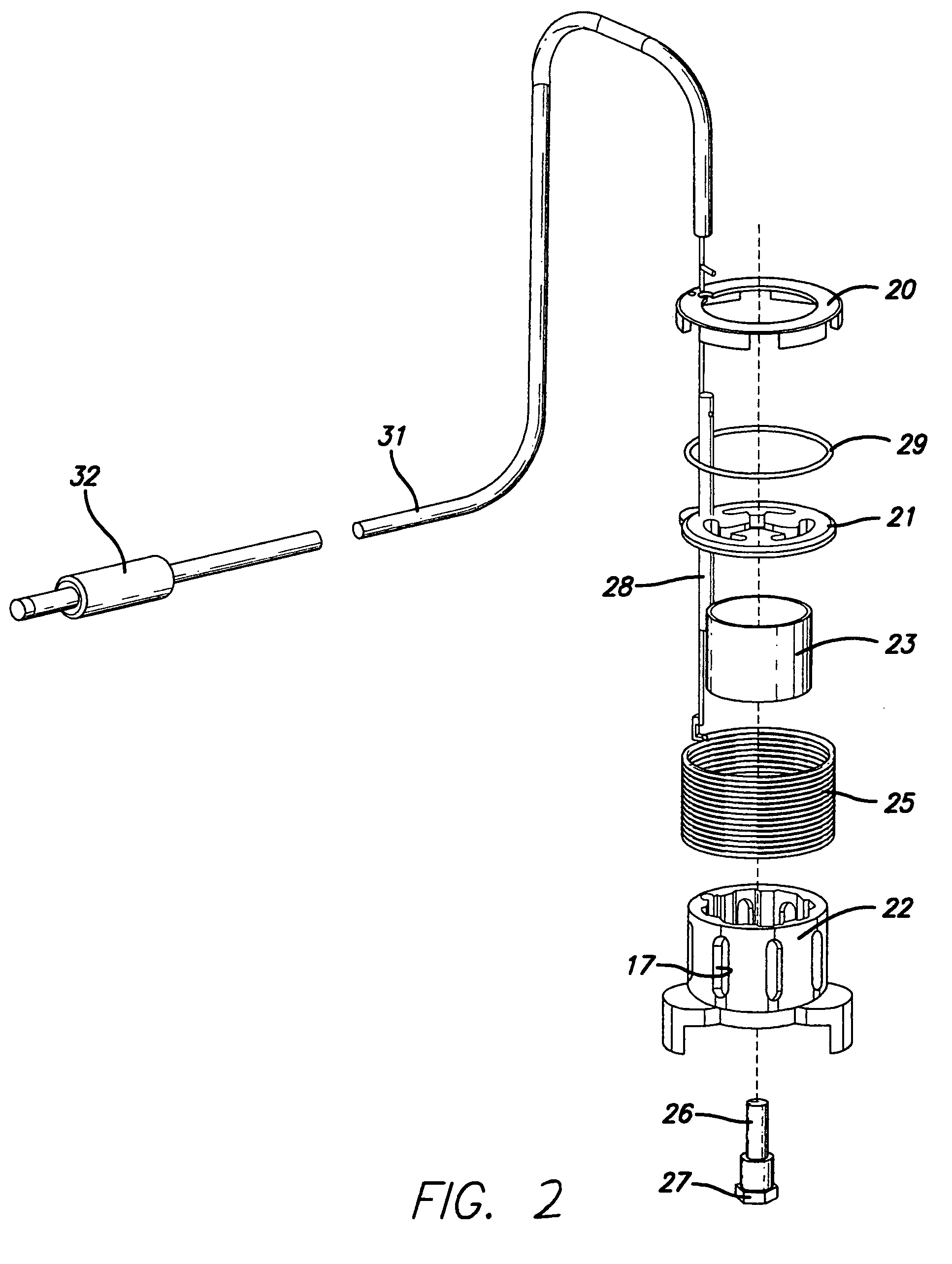Combination iontophoresis and detoxifying device and methods for use
a detoxifying device and iontophoresis technology, applied in bathing devices, physical therapy, therapy, etc., can solve the problems of patient shock, severe overheating, electric shock hazards, etc., and achieve the effect of preventing the reabsorption of chemicals
Inactive Publication Date: 2009-01-01
ERCHONIA CORP
View PDF8 Cites 8 Cited by
- Summary
- Abstract
- Description
- Claims
- Application Information
AI Technical Summary
Benefits of technology
[0015]In electrolysis mode, one array is submerged into a liquid reservoir to generate ions through electrolysis of the liquid. A patient submerges the body part to be treated in the reservoir. When activated, at least one electrode is negatively charged and at least one electrode is positively charged, causing the array to release ions into the liquid through electrolysis. The ions bind with chemicals released from the body part, preventing reabsorption of the chemicals.
Problems solved by technology
Thirdly, the acid, base, or salt electrolyte in the solution dissociates to its constituent ions.
These prior art devices suffer several disadvantages, however, such as potential electrical shock hazard and severe overheating.
Because the devices are powered by standard AC current during treatment, there is some risk that the patient would be shocked as a result of transient current spikes.
These salts and minerals dissolve into their constituent ions, which increase the flow of current through the electrodes to an unsustainable level as the treatment proceeded.
Early devices had no control over the duration, polarity or intensity of the treatment, other than to pull the plug from the power supply.
Thus, a treatment was limited in duration and control, and the devices burned out frequently.
The current and voltage spikes common to commercial AC power supplies exacerbated the burn-out problem.
These traditional iontophoretic techniques have drawbacks.
Often a patient may feel discomfort or experience redness or burns where the electrode contacts the skin.
These devices suffer potential electrical shock hazard and severe overheating.
Because standard AC current powers the devices during treatment, there is some risk that the patient would be shocked as a result of transient current spikes.
These salts and minerals dissolve into their constituent ions, which increase the flow of current through the electrodes to an unsustainable level as the treatment proceeds.
Early devices also had no ability to choose from more than one electrode and no control over the duration, polarity or intensity of the treatment, other than to pull the plug from the power supply.
Thus, a treatment was limited to one type of electrode and limited in duration and control.
Additionally, the devices burned out frequently.
Method used
the structure of the environmentally friendly knitted fabric provided by the present invention; figure 2 Flow chart of the yarn wrapping machine for environmentally friendly knitted fabrics and storage devices; image 3 Is the parameter map of the yarn covering machine
View moreImage
Smart Image Click on the blue labels to locate them in the text.
Smart ImageViewing Examples
Examples
Experimental program
Comparison scheme
Effect test
example 1
[0040]
Electrolytetap waterPositive duration5 minutes at1.5 ampsNegative duration5 minutes at1.5 amps
example 2
[0041]
tap water withElectrolytetable salt addedPositive duration12 minutes at0.75 ampsNegative duration12 minutes at0.75 amps
example 3
[0042]
Electrolytetap waterPositive duration15 minutes at1.5 ampsNegative duration2 minutes at1.5 amps
the structure of the environmentally friendly knitted fabric provided by the present invention; figure 2 Flow chart of the yarn wrapping machine for environmentally friendly knitted fabrics and storage devices; image 3 Is the parameter map of the yarn covering machine
Login to View More PUM
 Login to View More
Login to View More Abstract
A device for imparting a combination of therapies to a user's body or body parts has a first battery-powered array submerged into a liquid contained in a first reservoir and a second battery-powered array submerged into a liquid contained in a second reservoir. Each array has one or more degradable electrodes that release ions into the liquid in the reservoir. The electrodes can be copper, zinc, steel, silver, nickel, or a combination thereof. The solution in the reservoir may contain positively or negatively charged medicament ions. During a therapy session, the device is operated in one or both of an electrolysis mode and an iontophoresis mode. Direct current is applied to one or more of the electrodes depending on the mode selected and other session parameters. The device uses a current and voltage regulator to deliver a regulated amount of current through the arrays regardless of the conductivity of the liquid, and electronic circuitry is used to control the duration, polarity, electrode choice, and intensity of the treatment. Excessive heat is dissipated with a heat sink.
Description
CROSS-REFERENCE TO RELATED APPLICATIONS[0001]This application is a continuation in part of co-pending U.S. application Ser. No. 11 / 880,714, filed Jul. 24, 2007, which is a continuation in part of U.S. application Ser. No. 10 / 346,149, filed Jan. 15, 2003, now U.S. Pat. No. 7,341,597.FIELD OF INVENTION[0002]This invention relates generally to therapeutic devices and associated methods for introducing and removing substances through the skin. The invention relates particularly to a single device for applying several non-invasive transdermal therapies which conduct a charged substance into the body or remove unwanted chemicals from the body.BACKGROUND[0003]Electrolysis is the process of passing electric current through an electrolyte, thereby causing negative and positive ions to migrate to the positive and negative electrodes, respectively. In a solution containing water and an electrolyte, ions are created in at least three ways. H+ and OH− ions are formed as intermediaries as oxygen ...
Claims
the structure of the environmentally friendly knitted fabric provided by the present invention; figure 2 Flow chart of the yarn wrapping machine for environmentally friendly knitted fabrics and storage devices; image 3 Is the parameter map of the yarn covering machine
Login to View More Application Information
Patent Timeline
 Login to View More
Login to View More Patent Type & Authority Applications(United States)
IPC IPC(8): A61N1/30
CPCA61N1/445A61H35/006
Inventor SHANKS, STEVEN C.TUCEK, KEVIN
Owner ERCHONIA CORP
Features
- R&D
- Intellectual Property
- Life Sciences
- Materials
- Tech Scout
Why Patsnap Eureka
- Unparalleled Data Quality
- Higher Quality Content
- 60% Fewer Hallucinations
Social media
Patsnap Eureka Blog
Learn More Browse by: Latest US Patents, China's latest patents, Technical Efficacy Thesaurus, Application Domain, Technology Topic, Popular Technical Reports.
© 2025 PatSnap. All rights reserved.Legal|Privacy policy|Modern Slavery Act Transparency Statement|Sitemap|About US| Contact US: help@patsnap.com



